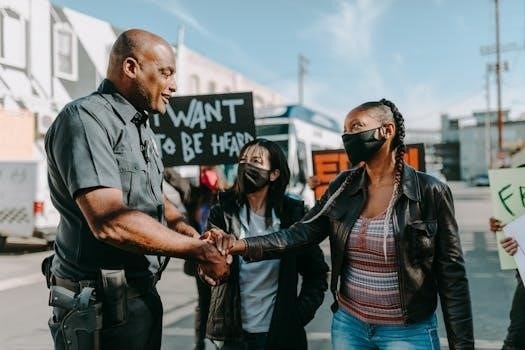Understanding Your Rights During Police Interactions
It’s crucial to know your rights when dealing with law enforcement. By knowing your rights, you can protect yourself during interactions with police. Many people are unaware of their rights, and this lack of knowledge can be exploited. Being informed makes for safer interactions with the police.
The Importance of Knowing Your Rights
Understanding your rights during police interactions is paramount for safeguarding your freedom and well-being. Often, police officers may not explicitly inform you of these rights, making it even more critical for individuals to proactively educate themselves. The power dynamic in such encounters can be intimidating, and the police are not always your friend. Knowing your rights allows you to assert yourself appropriately and avoid self-incrimination. Many police tactics are designed to elicit information, and by understanding your rights, you are better equipped to navigate these situations. Remember, the police should not evoke an incriminating response from a suspect without proper procedure. Familiarizing yourself with your rights ensures you are prepared to handle any police interaction with confidence and knowledge. It also helps you to avoid the “American TV” perception of police procedures. This knowledge is your first line of defense against unlawful police actions. Therefore, taking the time to learn about your rights is not just beneficial, it is essential for all citizens.
Why Police May Not Always Inform You of Your Rights
There are several reasons why police officers may not always inform you of your rights during an encounter. One primary reason is that they are often focused on gathering information and evidence. Informing you of your rights, such as the right to remain silent, could hinder their investigation. Police tactics are sometimes designed to elicit incriminating responses, and by not explicitly stating your rights, they can create an environment where you might inadvertently provide information that can be used against you. Furthermore, not all police encounters require them to read you your rights, particularly during a simple stop or questioning. Often, they operate under the belief that citizens know their rights, or if they don’t, the police are not obligated to educate them. This approach can lead to misunderstandings and potential violations of your rights. The burden of knowing your rights rests on the individual, highlighting the importance of being proactive in seeking this knowledge. It is essential to understand that the absence of a formal rights reading does not mean your rights do not exist. You must be prepared to assert them independently.

Fourth Amendment Rights and Police Encounters
The Fourth Amendment protects against unreasonable searches and seizures. Police often exploit loopholes, such as K9 unit practices, to skirt these rights. It’s crucial to understand how these tactics work and how to protect yourself from them.
Protection Against Unreasonable Searches and Seizures
The Fourth Amendment of the United States Constitution provides a fundamental safeguard against arbitrary intrusions by law enforcement. It specifically protects individuals from unreasonable searches and seizures, ensuring that the government cannot invade your privacy without proper justification; This protection means that law enforcement must generally obtain a warrant supported by probable cause before conducting a search of your person, home, or property; The warrant must describe the place to be searched and the items to be seized. However, there are exceptions to this rule, such as if you consent to a search, or if the police have probable cause to believe that evidence of a crime is in plain sight. Understanding these exceptions is crucial because they are often the areas where your rights may be challenged. Law enforcement is trained to look for these exceptions, and it is important that you are aware of them as well. Knowledge of these protections is vital in upholding your constitutional rights and preventing unlawful police conduct. It is also extremely important to document any encounter in order to have accurate records if needed for legal reasons.
K9 Unit Loopholes and Fourth Amendment Rights
The use of K9 units by law enforcement has created certain loopholes that can potentially circumvent your Fourth Amendment rights against unreasonable searches. Police sometimes exploit these loopholes, often during routine traffic stops. One common tactic involves using a dog sniff to establish probable cause for a search, even when no other reasonable suspicion exists. This is often the case where a dog “alerts” to the presence of drugs, which is then used as justification for a more intrusive search of the vehicle or person. However, these alerts are not infallible and can be prone to error, or even manipulation. The issue is that the courts have often given deference to the dog alerts, making it difficult to challenge their validity. This means that individuals must be extremely vigilant and assertive about protecting their rights when faced with K9 units and be aware that police have been known to engage in this tactic. Understanding the mechanics of these procedures and their potential for abuse is vital for safeguarding your constitutional protection against unlawful searches. It is important to document any encounter with police and to know your rights.

Common Misconceptions About Police Interactions
Many people believe that police procedures seen on American TV are accurate. This is a misconception that can lead to people making incorrect assumptions about their rights. The reality is that police often use interrogation tactics that can be manipulative.
The Myth of “American TV” Police Procedures
Popular television shows often depict police interactions that are far from reality, leading to widespread misconceptions about law enforcement procedures. The polished, dramatic scenarios portrayed on screen rarely reflect the nuanced and often complex nature of real-life police encounters. Unlike the clear-cut, rule-abiding detectives on TV, real police officers operate within a legal framework that can be interpreted differently, and they may not always follow the script we’ve come to expect from fiction.
This “American TV” portrayal of police work often simplifies complex legal concepts, leading viewers to believe that police are always forthcoming about a suspect’s rights. In reality, officers may not explicitly inform you of your rights, especially if they don’t believe they are required to. The focus on solving crimes quickly and efficiently on television can obscure the importance of due process and the protection of individual liberties. It is crucial to understand that real-life police interactions can be less straightforward and that relying solely on what you have seen on TV can leave you vulnerable to potential rights violations.
Interrogation Tactics and Incriminating Responses
Police interrogations are often designed to elicit incriminating responses from suspects, even if they are not guilty. A practice that the police should know is reasonably likely to evoke an incriminating response from a suspect amounts to interrogation. Officers may use various techniques, such as deceptive questioning, psychological pressure, and even outright lies, to obtain a confession. They might try to build rapport, downplay the severity of the situation, or create a sense of urgency to pressure you into talking.
It’s crucial to understand that anything you say during an interrogation can and likely will be used against you in court. Even seemingly harmless statements can be twisted to fit the police’s narrative. It’s important to be aware of these tactics and to exercise your right to remain silent. Remember, you are not obligated to answer questions and doing so without legal representation can be detrimental to your case. The police may try to convince you that cooperation will make things easier, but this is often a tactic to gain information. Never assume that what you say is private or off the record.

Practical Tips for Protecting Yourself
Protect yourself by knowing your rights during any encounter with law enforcement. Remain calm and assertive, and understand when to remain silent. Being aware of your rights is the first step in ensuring your safety and protecting yourself from possible unjust conduct.
Knowing Your Rights During a Traffic Stop
During a traffic stop, it’s crucial to understand your rights to protect yourself from potential overreach by law enforcement. Remember that a traffic stop, often initiated over minor infractions, can sometimes escalate into something more. You have the right to remain silent; anything you say can be used against you. Be polite but firm, avoiding any actions that might be misconstrued as resisting or threatening. You are generally required to provide your driver’s license, registration, and insurance information, but you are not obligated to answer other questions without legal representation.
It’s important not to open your car door unless specifically ordered by the officer. If the police request to search your vehicle, you are not required to consent. If you do not consent they can only search if they have probable cause. Remember, police may attempt to exploit loopholes, such as a K9 search. Understanding the limitations and rights during a traffic stop is important to protect yourself against unlawful actions. Be aware of any actions that could lead to an incriminating response.
Protecting Yourself from Unlawful Police Conduct
Protecting yourself from unlawful police conduct requires a proactive approach and a solid understanding of your rights. If you believe your rights have been violated, remember you have the right to document it. If possible, record the interaction with your phone or other devices; this can serve as crucial evidence. It is important to remain calm and assertive, not aggressive. Never resist an officer even if you believe the action is unlawful. Instead, comply with the commands, but state that you do not consent to any search or seizure, if applicable. After the encounter, seek legal advice from an attorney, who can advise you on how to file complaints.
Familiarize yourself with your local laws and regulations regarding police procedures, as they can vary. Don’t be intimidated by the officer’s authority; knowing your rights is your best defense. Remember that the police are not always going to inform you of your rights. The police will often use interrogation to try to get you to incriminate yourself. You can protect yourself by knowing your rights and being prepared. Understanding the limits of police power is essential for self-protection.
The Importance of Remaining Calm and Assertive
Remaining calm and assertive during a police interaction is crucial for protecting yourself and your rights. When confronted by law enforcement, it’s natural to feel anxious, but escalating the situation with anger or aggression can be detrimental. Maintaining composure allows you to think clearly and make rational decisions. Assertiveness, on the other hand, means knowing your rights and stating them respectfully. It does not mean being combative. If a police officer makes a false claim or takes an unlawful action, state “I do not consent to this search”.
By remaining calm, you can de-escalate the situation, which can prevent misunderstandings. Always remember that the goal is to resolve the encounter without unnecessary conflict and to protect yourself. It is always good to calmly but firmly state your rights, and to always remain polite to the police. Your behavior impacts how they will treat you. Showing you know your rights and that you are not going to be intimidated is key to protecting yourself from unlawful conduct.


